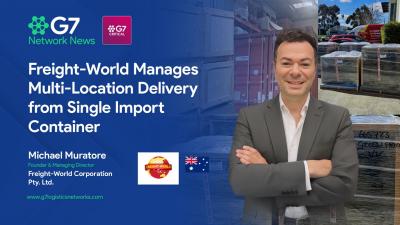Top Reasons Why SME Forwarders Are Competing and Winning Against Multinationals

Multinational logistics companies boast massive infrastructure, global contracts, and enterprise-grade tech. Their advantages include centralized systems, bulk pricing, and presence in every major market. According to Armstrong & Associates (2024), the top 25 global forwarders controlled over 43% of the world's freight volume.
Yet despite these advantages, small and medium-sized freight forwarders are thriving and in many cases, outperforming their multinational counterparts. The reason is simple: today’s market values speed, personalization, and long-term trust, all of which SME forwarders deliver better.
Here are the top reasons why SME forwarders are not only surviving but becoming the preferred choice for many shippers:
1. Superior Customer Service
A 2024 Ti Insight survey found that 72% of SME shippers rated independent forwarders higher for communication and responsiveness than multinationals. SMEs offer real-time updates, problem-solving, and customer-centric attention that’s hard to find in rigid corporate structures.
2. Owner-Run Means Higher Accountability
SMEs are often led by owners who are directly involved in operations. This results in more thoughtful service, faster decisions, and a clear sense of responsibility. Clients benefit from top-level attention without layers of management.
3. Stronger Relationship Building
Because owners are often the face of the business, relationships are long-lasting and personal. Unlike multinational setups where staff rotations are frequent, SME forwarders nurture customer ties that grow deeper year after year.
4. Stable Leadership, No Rotating Management
Most multinationals rotate country managers every 2 to 3 years. This disrupts continuity and forces customers to rebuild relationships. SMEs, on the other hand, offer consistency. Customers know who they’re dealing with long-term.
5. Agility and Faster Decision-Making
In a recent Freightos report (2024), 65% of shippers said they chose independent forwarders because of how quickly they could respond to changes. SMEs don’t need corporate approval chains to act. They adapt instantly.
6. Hyperlocal Knowledge
SMEs are embedded in their markets. They know customs officers, port schedules, local trucking options, and real-time risks better than anyone sitting in a regional HQ. This often leads to fewer delays and smarter routing.
7. Flexible Pricing and Payment Terms
Without the burden of head office targets and overhead, SMEs can customize rates and credit terms. This flexibility has become a key reason clients choose them, especially in volatile economic times.
8. Access to Modern Technology
Cloud-based freight management tools and affordable SaaS platforms have enabled SMEs to provide services such as real-time tracking, automated documentation, and shipment visibility. Tech is no longer exclusive to multinationals.
9. Niche Specialization
SME forwarders often master specialized cargo segments like temperature-sensitive, oversized, or urgent shipments. Shippers in 2024 reported that niche expertise was more important than global presence when choosing partners.
10. Global Reach Through Alliances like X2
Networks like X2 Logistics Networks empower SMEs with vetted global partnerships, payment protection programs, and shared business development initiatives. They allow independent forwarders to act globally while staying agile and independent.
The Takeaway
The logistics landscape is changing. SME forwarders are no longer just the alternative. They are the preferred option for many shippers. With owner-led service, faster execution, and smart use of technology and partnerships, they’re not playing catch-up. They’re leading the charge.
































